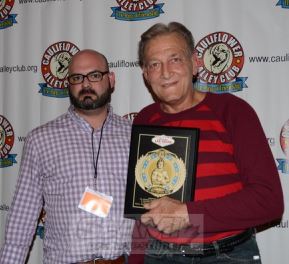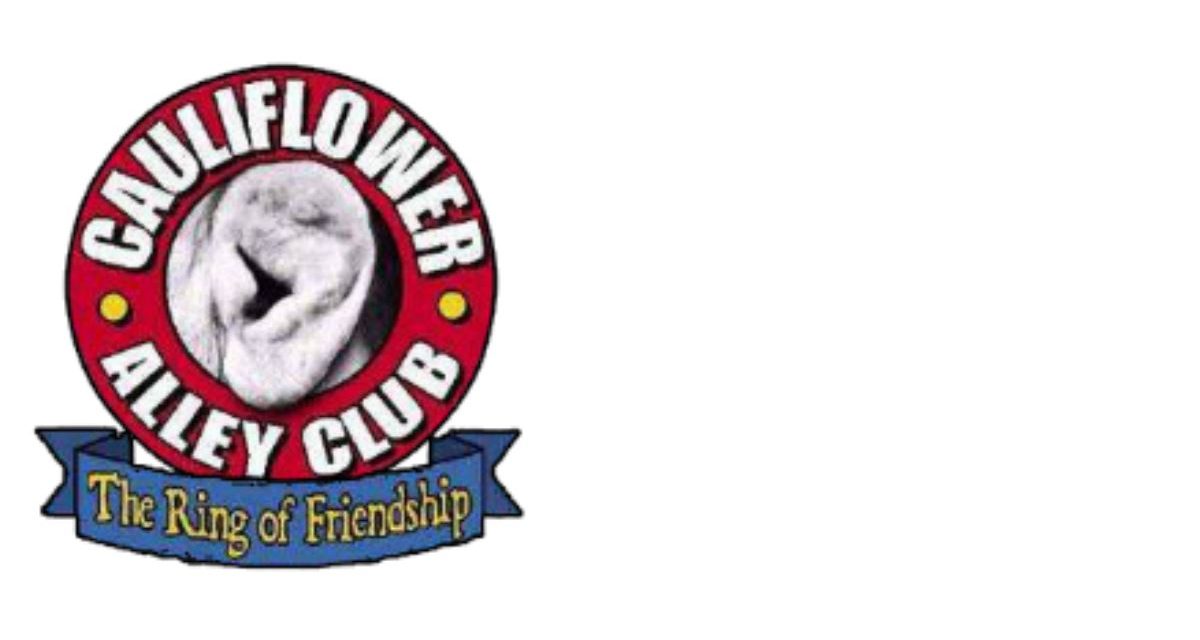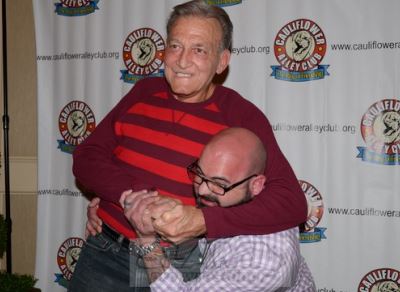The Cauliflower Alley Club reunions are always full of surprises. Arn Anderson, one of the best talkers ever on the microphone, only spoke for a couple of minutes for his acceptance speech. Then there’s Paul Orndorff, suffering from numerous maladies, including memory issues, stealing the show after a heartfelt speech from his son, Travis.

Travis and Paul Orndorff. Photos by Brad McFarlin
The scene was the Gold Coast Hotel & Casino in Las Vegas on Wednesday, April 13th, for the gala banquet where the top awards of the Cauliflower Alley Club were presented to deserving honourees.
“Mr. Wonderful” Paul Orndorff received a Men’s Wrestling Award, and was the second to last honouree.
His son, Travis Orndorff, introduced him. With self-deprecating humour, many references to growing up in a wrestling environment, Travis — a Vice President, Branch Manager at a Chase bank in Atlanta, Georgia — probably delivered the best speech of the evening. (The most entertaining by far was Ken Patera, but it was hardly coherent or printable, for that matter.)
What follows are slightly-edited transcripts of their speeches with a few notes indicating who they are referring to in the audience of 700 or so people.
TRAVIS ORNDORFF
I’m partying with [emcee] Mean Gene [Okerlund] tonight, and I’ve been drunk for four days. It’s an honour to be here, and it’s a privilege. It’s not very often that you get to present an award to your father after a prestigious career.
I actually have a life-long dream that I’m hoping that you can help me with, something that I’ve tried to fulfill. Actually, I’ve got a friend, Al, if you can help me with this. This is something that I’ve always wanted to do for my father. It’s okay. “Paul-a … Paul-a … Paul-a … Paul-a … Paul-a.”
During Ken [Patera]’s speech (ahem), I borrowed Karl [Lauer]’s dictionary and I looked up “royal pain in the ass” and actually everybody agrees that it was a picture of my father, and I’m right next to him, so I don’t know what that says.
In my life, I’ve been asked two questions, the first one being, “What was it like to grow up with Mr. Wonderful as your father?” The second one was, “What happened to you?” I’ve been feeling like Danny DeVito most of my life. …
I was using the rubber dumbbells in the gym. I’ll never forget the first time I disappointed him. It was when I threw a baseball. Fortunately, he came over and said, “You need to study a lot.”
I was the only nine year old — this is a true story — I was the only nine year old whose father pulled up in his pickup truck right behind the backstop and put our patio furniture in the back so he could multitask, watching my baseball game and getting a perfect tan. It was really difficult to explain to all the fathers why he did not have his shirt on all the time.
When I finally got older I had to kind of establish my own way. He was the Brandon Bull; I was the Brandon Bullshitter. He was Mr. Wonderful; I was Mr. Wonder Who His Dad Really Is.
Just for the record, he never practiced the piledriver on me. I do understand that he used some flip-flops to kick the shit out of Vader though. I wasn’t there, but that’s the story that I heard.
I had a completely different perspective about wrestling. I see Mr. [Ricky] Steamboat here. You guys see professional wrestlers but I see my babysitters. It was really awkward wearing the big robe, the big ring and a Rolex at eight, but I survived, so that’s cool.
While you might remember my father firing one of the greats, Bobby Heenan, I was in the back spelling “fired” for him, F-I-R-E-D-D. My father looked at me and said, “I’m just glad you studied.”
I was also present when my dad turned heel on this guy named Hulk Hogan. I didn’t get to see the match. I was in an ambulance, not that anything had happened bad, but because that was the only way you could get out of there safely. He comes out, he’s all tanned and shit, we get him in an ambulance and we drive a mile down the street — I think it was Philadelphia, I don’t remember, I was eight. There was no Google. But we get down the street and we get into this Cadillac. We think we’re going to get in and drive down the road and get to safety, and apparently somebody tipped them off. About 250 residents of Philadelphia decided to try to turn our car over. … I was in the car’s floorboard. They tipped it over and they brought the shield down and started shooting pistols. I decided at that point that he was right, and I probably should go to school. And I think I wet my pants.
But what was it like to have Mr. Wonderful as a father?
He taught me four lessons. He taught me more than that, but I thought four was appropriate.
Number One, he taught me to love my Heavenly Father.
Number Two, he would stop in front of any servicemember and tell them thank you, and more than likely pay for their meal. He taught me to serve my country and love my country.
He also taught me that salt and butter are real bad for you, so we didn’t enjoy food that much growing up, but I made up for it this week with Mean Gene.
And lastly, there’s not a day that goes by that he doesn’t call and tell me he’s proud of me, for whatever reason, that he loves me, and he loves my family.
Everybody thinks that when he retired, it was an injury. That’s not true. He just wanted to be home with his family, and tan in the back of a truck.
If you wonder what it was like, it was pretty frickin’ wonderful, just to be honest.
I’m going to channel my inner Bobby Heenan as best I can. I hope that I can show you the respect that you’re due.
Let me tell you a quick story, man. So I was eight, it seemed like an appropriate age to go see my dad at the Omni after I won this big karate tournament. So I come in with — you’re laughing, you’ve already heard it — so Bobby’s in the room and I go over to the Atlanta Hawks room. He says, “Who’s your favourite basketball player?” I’m like, “Dominique Wilkins.” That seems appropriate. He’s like the Human Highlight Film. Andre the Giant’s there, Studd’s there, so on and so on. Bobby’s like, “Let me show you a magic trick.” Don’t ever give anything to Bobby Heenan when he says, “Let me show you a magic trick.” So he handcuffs me to Dominique’s locker room. Now, I was in my gi, and all of a sudden, my dad goes to his match, the lights go off and my pants go down, and I just get poked. And I think there’s a Statute of Limitations on this, so I don’t really want to report it, but it was really taxing.
Without further ado, and I apologize for the profanity, get on your fucking feet for the greatest athlete to ever the grace professional wrestling, Mr. Wonderful Paul Orndorff.
PAUL ORNDORFF
I have a very weak heart, give me a minute. [Hugs Travis.]
I think if the people only knew how much I loved what I did for a living. Wrestling. I loved it. I’m a very emotional person, and that’s how I operated. When I got into the ring, it was all emotion, buddy. And you’d better be ready to go, because we’re going now, because you people paid damn good money out there to watch me wrestle and to watch my partner wrestle. If he didn’t live up to what he was, he was going to get stomped on pretty bad, because they had just made him look bad, because I was that way.
I was taught by Eddie Graham, Hiro Matsuda, Tampa, Florida, and if anybody Eddie Graham and Hiro Matsuda, heh heh, I do. I worked with them for nine months, six days a week. And I was an athlete. I was an All-American football player. I had the state record in Florida for 23 feet in broad jump, shot put 60-something feet. There wasn’t a sport that I couldn’t do or master, because that was my mentality.
Now, I wasn’t real good at school, to be honest with you. If I made a “C” that was like an “A” to me. If I made a “D,” that wasn’t bad. I had a lot of F’s, a lot of F’s. Thank God that my Mom and Dad, they loved me so much, we got away with it, I got away with it. I had coaches, not many of them would give me an “F” because I tried. But I wasn’t a real smart guy in a book. But when it comes to sports, or if it comes to fighting — because I used to be in a Fight Club in Florida. That Fight Club was, these big corporations of America came, different clubs, they’d have four or five guys and on the weekends you go somewhere and you’d have fistfights. I mean the real deal. I don’t mean working. I mean fistfights and you’d get paid. I’d get paid $200, $300, $400 sometimes. After a while, I quit that. That wasn’t worth it.
I was brought up pretty tough, I don’t mind telling you. I lived in a little trailer. The trailer was 22, 23 feet long. My father had cancer. They divorced, so I stayed with my Dad, stayed with him. As you can tell, I’m a very emotional person. Doing this was not easy for me. It’s hard, because the pain and the hurt, you know. …
I had a choice, football or wrestling. I wanted to go and try to do wrestling, because I liked to entertain people. I do, and I did. It took me a while, but after a while, I started to master it, I started to master it. Before I knew it, there crowds were getting bigger and bigger and bigger and bigger, and was getting bigger and bigger and bigger. I was 260 pounds.
I worked with the Arn Andersons, one of the best, the Ric Flairs, the Bobby Heenans. Those guys, there will never be another one like them. Never.
It’s a lost art, and it really was an art.
And not just anybody could master it. If you didn’t love wrestling, you weren’t going to master it. You’ll get a little paycheque.
It wasn’t about the money, it was about mastering it and being the best damn wrestler to put on a pair of trunks, have the best body — which I did. One of the best wrestlers ever in the business. That was my goal, and I did it. I’m in every hall of fame there is. Football, you name it, basketball, I’ve been all of it, because I worked hard. Because I had to have that, sigh, the people, it was for the people, really. To get that applause, because they know when you get good applause and people clap their hands and everything, you know you’re doing the right thing. That meant more to me than money, really. And I worked my butt off doing it.
I broke my neck broke three times, actually four times. After that fourth time, the doctor said, “Paul, if you do it any more, two things are going to happen. You’re going to end up in a wheelchair or you’re going to be six feet under.” I quit then, when he told me that, so I had to quit. I’ve got nuts and bolts and rods and everything else in my neck and I don’t even hurt no more. I still work out.
Wrestling was my life and I wouldn’t change one thing that I did.
The people that I worked with, like the Arns, and the Flairs, and all these people, the Bobby Heenans, those guys were all good, man. They were the best. We were the best back in them days. It’ll never be like that again, because nobody knows how to teach them how to do it the right way. It’s all psychology. If you’ve got the psychology, the people will come. They don’t know how to do it. It’s a lost cause. It’s sad. It’s sad that we don’t have it no more. But you all saw the best, you saw the best there ever was, or is, or ever will be. You’ve got guys here that were the best. And that’s pretty daggum good to me.
My son, Travis, he works for Chase bank — it is Chase, isn’t it? Okay. He’s a vice-president of a bank. Me and him are pretty tight. If I need a little money, I go to my son, and he helps me, he helps me. He’s a good boy. I love him to death. That’s why he’s here right now, he wanted to come.
I’m so blessed to be here this evening. A lot of you people, and I know your mommas and your daddies, I know something of them, I see them. There’s a few young people here, a lot of pretty girls — a LOT of pretty girls, and I see them, and they told me, and used to tell me about it, I hear that, and it just, boom, broke my head off because it’s like I’m re-living it.
I’m pretty quiet, stay in my own part of town. I don’t bother nobody. But don’t mess with me! Don’t mess with my family, because something bad is going to happen, I can promise you that — and that’s the way I was brought up. You take care of your family. And I do. I love my family, they know I love them. That boy right there’s been so good, he’s never given me a lick of trouble. Maybe a couple of times, but we stopped that in a hurry. You know what I mean Rick [Steamboat]? There’s another one, Rick, I’m sorry I didn’t see you. Now I see ya. Right there is one of the best workers ever in this business. And he helped me, he even helped me. That’s the way it was back then. We were kind of footloose, brothers, that’s even better, brothers. Some of us were sisters too. …
We were brothers, and you’re right about that, because everybody helped everybody.
[Action on stage, since Orndorff was running long.]
He just pinched me in the butt! …
Anyway, I see you guys, Arn, Ricky. Ricky was a really good friend of mine. He helped me a lot, back in the day he helped me, and I did too. …
I was in an era that in my opinion will never be repeated. Never. I don’t think it’ll happen again. That’s sad. I wish it did.
But I’d like to thank each and every one of you all very much. Thank you for coming. Thank you for helping me into the hall of fame and everything, and helping us, because that means a lot, those doing the helping. Brian Blair, which is my best friend ever, he’s the president — at least that’s what he’s telling me — so I believe him. Brian Blair, they don’t get no better than Brian Blair. He’s smart and he’s as tough as nails, buddy. I can promise you that me and him used have street fights back in the day; some of ya’ll know what I mean. We had street fights. And when you get challenged by another club or something, he was right with me when they happened.
Anyway, thank you to each and every one of you for coming. I love you, I truly do. Thank you very much.
RELATED LINKS


